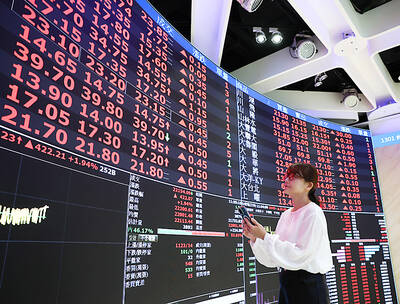Consumer electronic shoppers are increasingly favoring tablets and smartphones at the expense of PC sales, a report from research firm Gartner Inc showed.
Shipments of tablets are estimated to jump 70 percent this year as more lower-priced models are released, while smartphones such as Apple Inc’s iPhone and Samsung Electronic Co’s Galaxy S4 will advance 48 percent, Gartner predicted.
By contrast, desktops, full-size laptops, lightweight notebooks and computers that are convertible into tablets will fall 3.5 percent, Gartner said. Shipments of traditional PCs will drop 7.6 percent, it said.
Customers are using mobile devices for a broader array of computing needs. The shift has benefited Apple and Samsung, whose sales and profits have grown, while revenue at companies dependent on PCs such as Hewlett-Packard Co (HP), Dell Inc and Microsoft Corp have slumped.
“For PC vendors, this is bad news,” Carolina Milanesi, research vice president at Gartner, said in an interview. “The decline is happening in a much sharper way than what we initially anticipated.”
The drop in traditional computer shipments indicates that Microsoft’s redesign of the Windows operating system has not created the kind of demand computer and chipmakers like HP and Intel Corp had hoped for, Milanesi said.
PC sales fell 3.5 percent last year, according to Gartner.
“The hope was that everybody was going to get excited about Windows 8 and upgrade their devices, but they are struggling,” Milanesi said.
Further challenging Microsoft is that as consumers spend more time on smartphones and tablets, the ecosystem around those devices, such as Apple’s App Store and Google’s Play, becomes more important, Milanesi said.
The sale of software applications through those digital storefronts threatens Microsoft’s Office software business, she said.
“If you’re doing your tax returns you don’t need to have an Excel spreadsheet,” she said.
Dell, once the top seller of PCs, is another victim of the switch. Founder Michael Dell is attempting to take the company private as part of an effort to adjust to the changing dynamics away from the scrutiny of the public stock market.
While the PC business is struggling, the overall consumer-electronics industry is growing. When combining shipments of phones, tablets and PCs, device shipments is forecast to increase 9 percent this year to 2.41 billion, up 9 percent from last year, Gartner said.
Google’s Android operating system will account for 36 percent of those devices, Microsoft’s Windows software 14 percent, and Apple’s iOS and Mac software 12 percent, Gartner said.
Total device shipments are projected to hit 2.96 billion by 2017, Gartner said.

UNCERTAINTIES: Exports surged 34.1% and private investment grew 7.03% to outpace expectations in the first half, although US tariffs could stall momentum The Chung-Hua Institution for Economic Research (CIER, 中華經濟研究院) yesterday raised its GDP growth forecast to 3.05 percent this year on a robust first-half performance, but warned that US tariff threats and external uncertainty could stall momentum in the second half of the year. “The first half proved exceptionally strong, allowing room for optimism,” CIER president Lien Hsien-ming (連賢明) said. “But the growth momentum may slow moving forward due to US tariffs.” The tariff threat poses definite downside risks, although the scale of the impact remains unclear given the unpredictability of US President Donald Trump’s policies, Lien said. Despite the headwinds, Taiwan is likely

READY TO BUY: Shortly after Nvidia announced the approval, Chinese firms scrambled to order the H20 GPUs, which the company must send to the US government for approval Nvidia Corp chief executive officer Jensen Huang (黃仁勳) late on Monday said the technology giant has won approval from US President Donald Trump’s administration to sell its advanced H20 graphics processing units (GPUs) used to develop artificial intelligence (AI) to China. The news came in a company blog post late on Monday and Huang also spoke about the coup on China’s state-run China Global Television Network in remarks shown on X. “The US government has assured Nvidia that licenses will be granted, and Nvidia hopes to start deliveries soon,” the post said. “Today, I’m announcing that the US government has approved for us

When Lika Megreladze was a child, life in her native western Georgian region of Guria revolved around tea. Her mother worked for decades as a scientist at the Soviet Union’s Institute of Tea and Subtropical Crops in the village of Anaseuli, Georgia, perfecting cultivation methods for a Georgian tea industry that supplied the bulk of the vast communist state’s brews. “When I was a child, this was only my mum’s workplace. Only later I realized that it was something big,” she said. Now, the institute lies abandoned. Yellowed papers are strewn around its decaying corridors, and a statue of Soviet founder Vladimir Lenin

The National Stabilization Fund (NSF, 國安基金) is to continue supporting local shares, as uncertainties in international politics and the economy could affect Taiwanese industries’ global deployment and corporate profits, as well as affect stock movement and investor confidence, the Ministry of Finance said in a statement yesterday. The NT$500 billion (US$17.1 billion) fund would remain active in the stock market as the US’ tariff measures have not yet been fully finalized, which would drive international capital flows and global supply chain restructuring, the ministry said after the a meeting of the fund’s steering committee. Along with ongoing geopolitical risks and an unfavorable